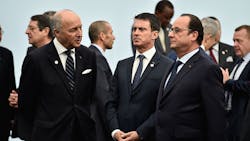Climate Talks: Developing Countries Say They Need More Aid
LE BOURGET, France—Developing countries warned Wednesday that United Nations talks in search of a climate-rescue pact risk foundering without finance commitments from rich nations.
Negotiations under way at a high-profile conference outside Paris are deeply divided on the issue of aid to help developing nations make the costly shift away from climate-harming fossil fuel and shore up defenses against future harms.
"The Paris outcome must provide clarity on the level of financial support that will be provided by developed country parties," the G77 and China group of 134 developing nations said in a statement to the 195-nation climate forum.
It called for a "substantial scaling up of finance" over the $100 billion (94 billion euros) a year that rich countries had promised to muster from 2020.
"Nothing ... can be achieved without the provision of means of implementation to enable developing countries to play their part to address climate change," it said.
Rich countries are obliged to provide such help under the U.N. climate convention, the statement added.
"This is a legal obligation under the convention. It is neither 'aid' nor 'charity'."
India said poor countries cannot be expected to make the shift away from cheap and abundant coal at the expense of struggling populations, many of whom do not even have access to electricity.
'Little or No Voice'
Countries that powered their way to wealth on the back of cheap energy must now give financial support to poorer nations being asked to use more expensive, clean energy, said Ajay Mathur, an Indian energy official taking part in the negotiations.
India, also a G77 member, is the world's third biggest carbon-emitting country. It has vowed to reduce carbon intensity --the amount of pollution per dollar of GDP--by up to 35% by 2030.
But, unlike the world's top two emitters the United States and China, it balks at net carbon reduction and has vowed to double coal production by 2020.
Asked about calls from the West for India to take on stricter carbon-cutting targets, Mathur said: "You can't have it both ways.
"If there are ambitious targets, those ambitious targets would have to be accompanied by what in the jargon of this process is called the means of implementation, the finance, the technology, the capacity."
U.S. negotiator Todd Stern pointed to a recent report that said $62 billion was spent on climate finance in 2014.
"We are at a pretty high number, both where we are now and where we are projected to be in the next few years," the envoy said.
He stressed that the "donor base" had expanded as formerly poor nations have become richer.
The G77 has rejected attempts to redefine who should be giving and who should be receiving money.
"If the world has really changed so much, we ask why it is that after all these decades all our members remain developing countries with little or no voice in global decision-making processes and institutions?," it said in the statement.
Copyright Agence France-Presse, 2015.
About the Author
Agence France-Presse
Copyright Agence France-Presse, 2002-2025. AFP text, photos, graphics and logos shall not be reproduced, published, broadcast, rewritten for broadcast or publication or redistributed directly or indirectly in any medium. AFP shall not be held liable for any delays, inaccuracies, errors or omissions in any AFP content, or for any actions taken in consequence.
